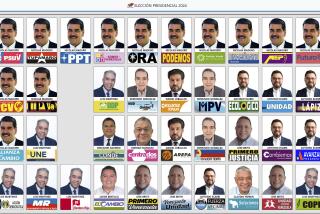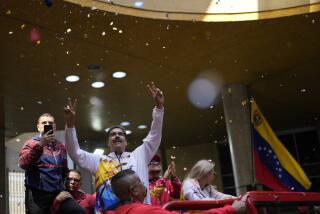Soviet Election Campaigning Unleashes Years of Frustration
- Share via
MOSCOW — Years’ worth of pent-up political frustration are pouring forth in the Soviet Union’s current parliamentary elections as candidates and their supporters scramble for their first real chance at power in decades.
From working-class suburbs to such august institutions as the Soviet Academy of Sciences, people are starting to say “no” to the diktats of Communist Party, government and other bureaucrats and not only insisting that they be heard but also asserting their right to elect their own candidates for the nationwide elections this weekend.
In a rare rebellion at the Soviet Academy of Sciences, one of the most typical organizations of the Soviet Establishment, nearly half the members, corresponding members and other delegates to its electoral meeting refused this week to vote for any of the 23 candidates nominated by the academy leadership for its 20 special seats in the new legislature.
Instead, they crossed out most or even all the nominees’ names--only eight candidates received enough votes to be elected--and thus forced another round of voting next month, when liberals such as Andrei D. Sakharov, the Nobel Peace Prize winner, can be nominated.
On Moscow’s Gorky Street, across from the City Hall, more than 7,000 supporters of Boris N. Yeltsin, the former Moscow party leader who is running in virtual opposition to the party, rallied Wednesday evening for the second time this week to protest what they called unfair and illegal restrictions on his campaign.
“Yel-tsin! Yel-tsin!” they called in a rhythmic chant that could be heard down in Red Square and the Kremlin. The party’s attempts to defeat Yeltsin, ousted from the ruling Politburo a year ago for his radical populism, appear instead to have boosted his standing, among blue-collar workers and intellectuals alike, adding to his challenge to the party leadership.
“Down with Ligachev!” the demonstrators shouted, denouncing Yegor K. Ligachev, the Politburo’s leading conservative, who is widely seen as Yeltsin’s main antagonist in the party’s Central Committee.
In the political shorthand of this campaign, which is already a unique event in Soviet history, Yeltsin has come to represent the common man’s deep and difficult-to-express resentment of the party, its leadership and its apparatchiki for all that they have bungled over the years and are still bungling today--and Ligachev has become the personification of all that they resent.
Pulling out their red party membership cards, still the passports to privilege in a have-not society, many of the demonstrators said they are ready to quit if Yeltsin is defeated. Police contained the unauthorized demonstration but did not actively intervene.
Even in the quiet chambers of the Soviet Peace Committee, where the carefully scripted talk is usually of the brotherhood of man, the common values of humanity and the need for reconciliation, delegates choosing the committee’s representatives in the Congress of People’s Deputies rebelled in their own small way this week.
They unhesitatingly dropped Georgy A. Arbatov, the longtime director of the Institute of the U.S.A. and Canada, after public complaints that he was an autocrat and a man who reflected the old “time of stagnation” rather than the present “new political thinking.”
Instead, to the surprise of the official Soviet news agency Tass, which had expected Arbatov’s election, they chose a medical researcher from Siberia, the editor of a rural magazine from Byelorussia and the patriarch of the Russian Orthodox Church as well as the Peace Committee’s chairman and vice chairman to represent it in the congress.
“People are sick and tired of being dictated to,” a speaker at Wednesday’s rally for Yeltsin declared as a city official stood by, glowering ferociously but not intervening.
Although Soviet voters have no ability, even under the latest political reforms, to work big changes in the country’s leadership through the parliamentary elections, they are finding, as much through experimentation as a thought-out strategy, that they can at least use the contests to say things that in the past could not have been said.
But they are also finding that, when they focus their efforts on narrow targets, such as the election of Yeltsin or the rejection of the Academy of Sciences’ slate of deputies, they do have at least a bit of power.
“This rejection of the ‘party list’ was necessary, though there were worthy people on it,” Sakharov said after the Academy of Sciences meeting concluded Wednesday. “Now we can make our own choice. We can choose 12 new people or remain with the previous ones if we wish.”
Sakharov, along with other leading liberal scientists, was nominated by a number of “work collectives” at major research institutes but was excluded from the officially proposed list of candidates from the Academy of Sciences. Attempts to reopen the nominations were frustrated by the academy leadership, and a public demonstration by angry scientists last month brought little result.
“We have a new political system, and we are still discovering how it works, when it works, if it works,” a participant in the Academy of Sciences meeting commented.
On Sunday, Soviet voters will go to the polls in 1,500 territorial constituencies for two houses of the Congress of People’s Deputies in the country’s first contested national elections since the earliest days of the Soviet state. Although about a quarter of the candidates, usually local party officials, are unopposed, most of the other races are being fiercely fought to the end.
Under the new political reforms, 750 additional seats in a third house of the congress are being filled with representatives of “public organizations.” These range from the Communist Party and the trade union federation, which each chose 100 deputies, through a variety of scientific and artistic unions to a number of small groups, such as temperance campaigners and stamp collectors.
From among these 2,250 deputies, about 450 will be chosen as members of the new and strengthened Supreme Soviet, which will become a full-time legislative body whose chairman, certain to be Mikhail S. Gorbachev, the party’s general secretary, will be the country’s president.
More to Read
Sign up for Essential California
The most important California stories and recommendations in your inbox every morning.
You may occasionally receive promotional content from the Los Angeles Times.













